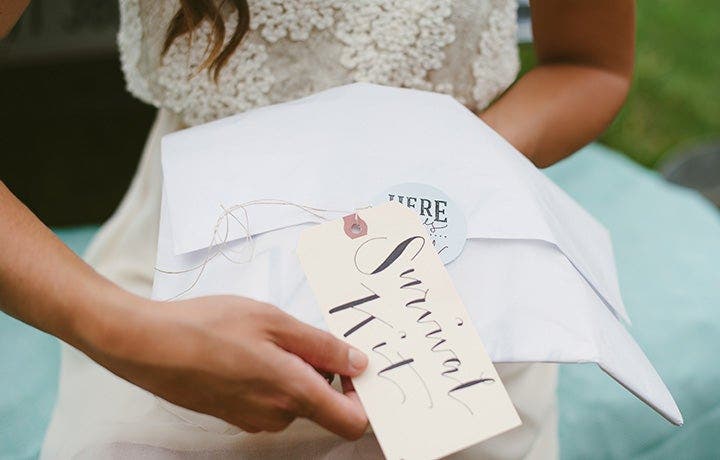4 Ways to Keep Perspective While Planning Your Wedding


While your wedding day has a good chance of going down as one of the happiest of your life, research shows it may also be one of the most stressful. According to the Holmes-Rahe Stress Inventory—a stress-rating scale doctors use—marriage ranks No. 7 on the list of 43 life events, just behind major personal injury or illness and just ahead of getting fired from your job. Considering this, it’s no wonder all of the planning involved in pulling off that big day can leave you feeling more exasperated than ecstatic.
“When we’re under a lot of stress, it may bring out areas of our personality where we tend to struggle or get stuck, which can prompt us to lose sight of the forest for the trees,” says Sonia Kahn, PsyD, a licensed clinical psychologist in Arlington, VA. “Stress has been shown to have negative impacts on a person’s typical level of functioning, which may expose underlying issues or conflicts and make the individual more prone to engage in problematic, unhealthy, or immature behaviors.”
While every bride is unique, these perspective busters tend to show up in some classic ways—all of which are manageable. “For example, if you’re a bit disorganized, you might find it hard to keep track of all of the details. If you’re Type A, you might get a little obsessive over those details. If you care a lot about what others think, you may find yourself people pleasing to a fault. When you know where you tend to get caught, it can help you navigate those situations when they surface.”
It’s worth pinning down your style, not just so you can handle its fallout better. Knowing how you lose perspective helps you and your fiancé better understand how to take care of yourselves—and each other—during stressful times, says Jill Dawson, a licensed professional counselor in Boulder, CO. “Consider it practice for how you’ll deal with other intense life events that are bound to happen.”
Find your biggest perspective buster and discover the experts’ best tips for sailing through your stuff:
You’re overwhelmed and constantly getting lost in the details.
The fix: Delegate—and vent.
If hiring a wedding planner is feasible for your budget, go for it. If not, now’s the time to lean on your support network, suggests Dawson. You might ask your sister to help you make a decision on the invitation font and assign each of your bridesmaids one small task that’ll knock a few to-dos off your list. “Remember that your friends and family genuinely want to support you, so don’t feel bad about leaning on them,” says Dawson.
It’s also important to realize that it’s possible your anxiety doesn’t have anything to do with choosing fonts, flowers, or favors. Getting overwhelmed may be a signal that other feelings are stirring up, like anger, fear, or sadness. It’s normal to have these—they’re part of any real-life relationship, says Kahn. It doesn’t help to pretend you don’t feel these things and bottle up your inner dialogue. But recognizing what you’re thinking and having a conversation or venting about it with your partner, best friend, or even a therapist, can help you feel more in control, says Kahn.
You’re people pleasing to the point of making everyone happy other than yourself.
The fix: Get clear on what really matters to you.
From your parents and future in-laws to the groom, his guy friends, and even your posse of gluten-free gym buddies, it can be tempting to try to make everyone happy. Couple that with the fact that your family and closest friends likely have a lot of opinions on how your wedding should go down and it’s enough to completely lose sight of what you and your soon-to-be hubs really want.
“The bottom line is that your wedding day really should be all about what matters to you and your fiancé,” Dawson says. “Sure, there’ll be some compromises, especially when someone else is paying for something. Yet it’s important to be willing to stay true to who you are as a couple so that your celebration feels like your day—not an event you planned that makes everyone else happy.”
To do that, you’ve got to name your non-negotiables—the things you’re not willing to sacrifice. If you really want a small, intimate gathering, it means you’re going to have to tell your mom she can’t invite all of her co-workers. If your hearts are set on a live band, you’ll have to let your Uncle Frank the DJ down. “Really paying attention to what you’re most wanting and needing for your wedding day will help you figure out where to set boundaries so you can manage others’ expectations,” adds Kahn. “Even better, it’ll help you set the stage for you and your spouse knowing how to draw boundaries that work for you after your wedding day.”
You’re catastrophizing, focusing on the things that could go wrong.
The fix: Bring yourself into the present and take yourself out of the future.
It’s easy to let a lot of worst-possible scenarios play out in your mind. Torrential downpours, drunk college-age cousins, dress-fitting issues—the list goes on (and on). And while this kind of thinking is understandable (so many details mean so many opportunities for something to go wrong!), it’s not helpful, says Dawson. “When you catastrophize, you’re thinking about some future issue that may or may not happen,” she says. And no matter how much you worry, you can’t control the future, and it’s important to realize that some things will inevitably slip through the cracks, says Dawson. “When there are so many moving pieces, expecting everything to play out exactly as you want it to just isn’t realistic,” she adds.
So step out of the future and into the present. “The more you can live in the present moment, the calmer you’ll feel—and the more efficient and effective you’ll be in the wedding-planning process.” Dawson’s trick for getting present: Have some sort of “anchor” that serves as a reminder to stop yourself from going too far down the what-if path. “It might be a special necklace or ring that you touch every time your mind starts spiraling,” she says, “or you might even commit to texting a friend who always knows just what to say to give you a gentle reality check.”
You’re aiming for perfection, and won’t be happy with anything less.
The fix: Remind yourself that your guests are coming to celebrate you.
Here’s something you probably don’t want to hear considering how much time and energy you’ve put into every last detail of your wedding ceremony and reception: Most of your guests don’t care that much about how their napkins are folded and what the little note on their favor says. “For the most part, the people paying attention to details like that are guests who are planning their own weddings, or professional event planners,” says Kahn. “Everyone else is going to be focusing on how much fun they’re having.”
“Try to remember that what makes weddings so much fun—and the pictures and memories most beautiful—is you and your beloved being genuinely happy,” says Dawson. “That’s what makes a wedding celebration ‘perfect.’”
